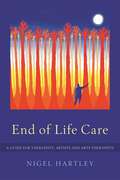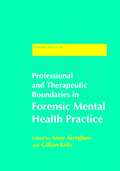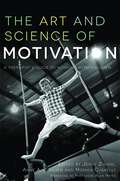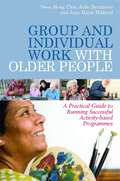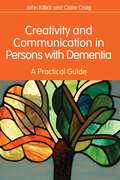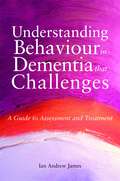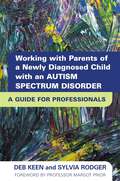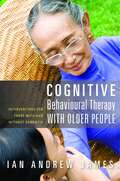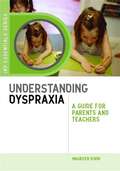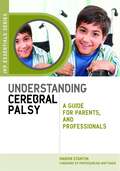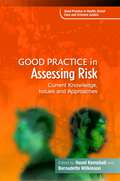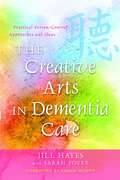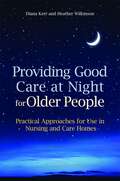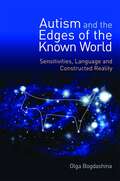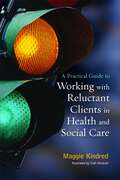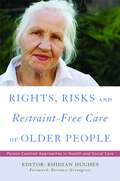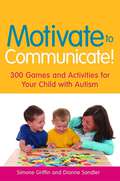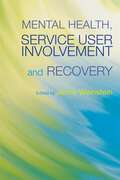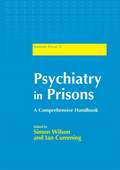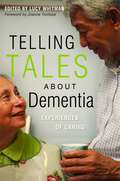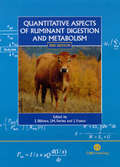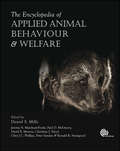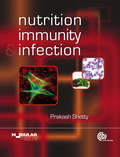- Table View
- List View
Professional and Therapeutic Boundaries in Forensic Mental Health Practice
by Edited by Anne Aiyegbusi Gillian KellyPeople who are detained in or who use forensic mental health services are defined by the fact that they have violated boundaries, often in many ways. For clinicians employed to work therapeutically with this client group however, the capacity to initiate and maintain boundaries is critical to safety as well as to good treatment outcomes. This book provides a thorough introduction to the subject of professional and therapeutic boundaries and their particular complexities within forensic mental health settings. The contributors, all experts in their respective fields, address the challenges of establishing working boundaries within forensic mental health services from multiple perspectives. They explore the ways in which boundaries can be initiated and maintained in different areas of forensic mental health work, including in psychotherapy, mental health nursing, arts therapies, forensic psychiatry and family therapy, and when working with different client groups, including children and adolescents, offenders with severe personality disorders in high security settings and sex offenders. Consideration is also given to boundaries and homicide, maternal boundary violations and boundaries in a forensic learning disability service. This authoritative, interdisciplinary resource will support all forensic mental health practitioners in this crucial aspect of their work.
The Art and Science of Motivation
by Jenny Ziviani Anne A. Poulsen Monica CuskellyPlacing motivation at the heart of all encounters and therapeutic activities, this book presents a groundbreaking, evidence-based model for working with children, including those with physical disabilities, learning disabilities and emotional and behavioural difficulties. Drawing on Self-Determination Theory (SDT), the authors describe this innovative paradigm - the model of Synthesis of Child, Occupational Performance and Environment - in Time (SCOPE-IT) - and explain how it can be used to sustain the child's motivation and active involvement in the therapeutic process. They suggest ways of using language and of structuring and working with the environment to maximise engagement and autonomy and achieve the best possible treatment outcomes. The challenges professionals may face when working with children are also clearly addressed, and engaging case studies and photographs place the key theoretical concepts in a richly human and personal context. Combining accessible theory with a wealth of tools and strategies for practice, this book is essential reading for all those working therapeutically with children, including occupational therapists, speech and language therapists, psychologists and psychotherapists.
Group and Individual Work with Older People
by Swee Hong Chia Julie Heathcote Jane Marie HibberdBeing active is fundamental to a person's sense of physical and mental wellbeing, and the need to engage in purposeful and meaningful activity does not diminish with age. However, common effects of ageing, such as reduced vision and hearing, arthritis, dementia, and in some cases social isolation, can affect an older person's ability to participate in therapeutic and recreational activities. Introducing the concept of PIE (Planning, Implementation and Evaluation), this practical resource will enable professionals working with older people to initiate and run successful activity-based programmes with their clients, either individually or in groups. The authors guide the reader through the processes of group and individual work, and provide step-by-step instructions for a range of activities, including arts and crafts, music, drama, movement, relaxation, reminiscence, and day-to-day tasks such as taking care of personal hygiene and preparing food and drinks. The book also describes the importance of assessing and evaluating activity-based work, with examples of completed evaluation and assessment forms. Useful case studies and self-reflective activities for the facilitator are included throughout. This book will be an invaluable for occupational therapists, creative arts therapists, health and social care practitioners and all other professionals working with older people.
Creativity and Communication in Persons with Dementia
by Claire Craig John KillickProviding people with dementia with opportunities to engage in creative activity can play a crucial role in maintaining and enhancing communication, and in reinforcing personhood and identity. This thoughtful book describes how people with dementia, and the people who work with and care for them, can foster and develop a creative approach, and provides rich and varied ideas for creative activities. The authors explore the concept of creativity - what exactly it is, its particular relevance for people with dementia and how to get into the creative 'flow'. They introduce a range of creative art forms, including poetry and story-telling, collage, drama, music-making, photography, textiles and working with wood and metal, and suggest possibilities for employing them in a range of settings, and with people of all abilities. Consideration is given to the practicalities of facilitating such creative work, including how to organise and run sessions, how to involve people with dementia and their carers, and how to reflect upon the experience. Practice examples are included throughout the book, as well as the comments and observations of people with dementia, and many examples of the artwork and poetry the authors have created with people with dementia over the years. Brimming with ideas, suggestions and helpful guidance, this is an essential resource for all those who work with people with dementia, and an inspiring read for people with dementia and their families.
Working with Parents of a Newly Diagnosed Child with an Autism Spectrum Disorder
by Sylvia Rodger Deb Keenxx
Understanding Dyspraxia
by Maureen BoonThis fully-updated second edition of Helping Children with Dyspraxia has been revised to reflect current practice and developments, providing clear and positive answers to questions commonly asked by parents and teachers about dyspraxia. Maureen Boon draws on her considerable experience of working with children with movement disorders to identify the characteristics of dyspraxia, explaining assessment procedures and identifying what can be done to help. New reflections appear on concepts such as physical literacy and whether or not incidence of dyspraxia has increased, and in an overview of the characteristics and causes of the condition, a comprehensive update on how it is identified and assessed is provided. Terminology is reviewed, and the full range of therapeutic interventions that are available are outlined. New case studies and photographs are used to illustrate successful interventions in practice, and a helpful appendix with up-to-date details of useful publications, programmes, equipment and organisations is also included. Understanding Dyspraxia is a concise yet comprehensive handbook for parents and teachers. Its clear structure and practical, positive advice will make it an invaluable resource for anyone involved with a dyspraxic child.
Understanding Cerebral Palsy
by Marion StantonAn invaluable starting point for anyone encountering cerebral palsy for the first time, this book provides essential background information on causes, types and symptoms, as well as vital advice about the treatments, therapies and sources of support available. Practical tips on everyday considerations such as communication, diet and education will help parents achieve the best quality of life for their child. A final chapter explores options after compulsory education and how best to support a young person making the transition to independent adulthood. Using personal experience and case studies as sources of inspiration, as well as a comprehensive list of resources to signpost readers to further information, this positive handbook will help parents and professionals more fully understand cerebral palsy and the different options available to people with the condition.
Good Practice in Assessing Risk
by Bernadette Wilkinson Edited by Hazel KemshallMaintaining a balance between managing and assessing risk and upholding the required high standards of practice in health and social care can be demanding, particularly in the current climate of increased preoccupation with the difficult tensions between rights, protection and risk-taking. Good Practice in Assessing Risk is a comprehensive guide to good practice for those working with risk, covering a wide variety of health, social care and criminal justice settings including child protection, mental health, work with sex offenders and work with victims of domestic violence. The contributors discuss a range of key issues relating to risk including positive risk-taking, collaborating with victims and practitioners in the design of assessment tools, resilience to risk, and defensibility. The book also explores the role of bureaucracy in hindering high quality professional practice, complex decision-making in situations of stress or potential blame, and involving service users in assessment. This book reflects the latest policy and practice within health, social care and criminal justice and will be an invaluable volume to all professionals working in these fields.
The Creative Arts in Dementia Care
by Jill Hayes Sarah PoveyThe physical care of people with dementia is of vital importance, but so too is their emotional, social, mental and spiritual wellbeing. The creative arts are gaining increasing recognition not only as a tool for delivering effective person-centred dementia care, but also for attending to soul as well as body. Encouraging those who care for people with dementia to develop their own creative skills, this book provides a creative map of care with easy-to-follow examples and detailed case studies. After explaining why adopting a creative approach is central to effective dementia care, the authors go on to discuss meditation, singing, movement and storytelling, describing the therapeutic benefits of each and giving practical examples of how they can be used with individuals or groups. They also look at the importance of creative supervision in promoting creativity and creating a safe space for honest interpersonal connection: an essential foundation for effective teamwork. This book will be an invaluable resource for anyone involved in the care of a person with dementia, including professional staff in residential and nursing homes, hospitals and day centres, families and other non-professional carers.
Providing Good Care at Night for Older People
by Diana Kerr Heather WilkinsonThe experiences and needs of residents and patients in nursing and care homes are very different at night, and this is particularly true for those with dementia. Yet nursing and care homes are not always inspected with the same rigour at night as they are during the day, and night staff do not always receive the same levels of training, resources and supervision as day staff. This book provides night staff, their managers and anyone else with an interest in care homes during the night with the information, knowledge and practical skills they need to deliver positive and appropriate care at night. The authors look at all of the issues that are particularly pertinent in caring for older people at night, including nutrition and hydration, continence, challenging behaviour, medication, night time checking, pain management and end of life care. They also look at the impact that working at night has on care staff, and offer practical suggestions to help them to safeguard their own health. The final chapter provides a set of night time care guidelines for inspectors that can also be used by managers to evaluate night time practices in their homes. This book is essential reading for night staff and their managers and employers, as well as inspectors of services, policy makers, and anyone else with an interest in the provision of care for older people.
Autism and the Edges of the Known World
by Olga BogdashinaIn this intelligent and incisive book, Olga Bogdashina explores old and new theories of sensory perception and communication in autism. Drawing on linguistics, philosophy, neuroscience, psychology, anthropology and quantum mechanics, she looks at how the nature of the senses inform an individual's view of the world, and how language both reflects and constructs that view. Examining the 'whys' and 'hows' of the senses, and the role of language, Olga Bogdashina challenges common perceptions of what it means to be 'normal' and 'abnormal'. In doing so she shows that autism can help to illuminate our understanding of what it means to be human, and of how we develop faculties that shape our cognition, language, and behaviour. In the final chapter, she explores phenomena often associated with the paranormal - including premonitions, telepathy and déjà vu - and shows that these can largely be explained in natural terms. This book will appeal to anyone with a personal or professional interest in autism, including students and researchers, clinical practitioners, individuals on the autism spectrum and their families, teachers, speech and occupational therapists, and other professionals.
A Practical Guide to Working with Reluctant Clients in Health and Social Care
by Maggie KindredPractitioners in health and social care are often required to work with clients who do not want to work with them, and these 'reluctant' clients can often be the most challenging, but most rewarding, to work with. This practical, jargon-free book covers all the issues that practitioners are likely to encounter in the course of working with reluctant clients. The emphasis is on making theory easy to use, and the book is written in an easily digestible and lively style. Topics covered include staying safe, verbal and non-verbal communication, making initial contact with a client, crisis situations, recording, and how to end work with a client. Activities to work through are included at the end of each topic and illustrations feature throughout. This is an essential book for students, practitioners, voluntary sector workers and trainers in the fields of health, social care and social work.
Rights, Risk and Restraint-Free Care of Older People
by Edited by Rhidian HughesThe restraint of older people is a pressing issue for health and social care practice. This book provides health and social care professionals with an authoritative reading resource on the ethics and use of restraint. The book provides an overview of the different forms of restraint, the conditions under which they are used, and their implications for the health and wellbeing of older people. Practical approaches to minimising are then explored, underlining the importance of person-centred care. Innovative programmes and approaches to reducing the use of restraint from around the world are described and assessed, and case studies are drawn upon to highlight practice challenges and their effective resolutions. The perspectives of older people and their carers and families, as well as of professionals, commissioners and regulators of health and social care, are also taken into account. The contributors are drawn from an international range of health and social care settings, as well as from the academic world. This in-depth volume will help health and social care professionals better understand the complex issues that surround the use of restraint, support practice that puts older people at the centre of decision-making about their care, and enable services to provide safer and more appropriate care.
Motivate to Communicate!
by Simone Griffin Dianne SandlerThis practical resource is brimming with exciting ideas and guidance for motivating children with autism and other communication difficulties. The clear, user-friendly format enables quick access to over 300 practical, fun-filled games and activities for developing your child's communication skills. The book suggests creative ways to use everyday toys and objects. For example, if your child likes to pop bubbles, perhaps he would also enjoy counting bubbles, catching bubbles on a wand, stomping them with his feet or even playing bubble volleyball! The innovative ideas in this book have been developed over 40 years of clinical and educational experience, and are designed to be fun for both the adult and the child. All resources mentioned in this book are readily available and can be used to advance communication skills at all levels, from reaching out for an item, to extending verbal communication. Motivate to Communicate! is perfect for supporting parents, care-givers and professionals in motivating and developing the communication skills of children on the autism spectrum.
Mental Health, Service User Involvement and Recovery
by Jenny WeinsteinAs the momentum for personalisation and recovery approaches grows, service users are increasingly participating as partners in all aspects of health and social care delivery, policy-making and professional training. This book provides an overview of service user involvement in mental health, its origins and current practice and policy. Written cooperatively by service users and academics, this book conveys a vital connection between recovery and involvement, offering a framework of values and helpful strategies to promote meaningful user participation. By sharing their personal narratives and contributing their views, service user authors demonstrate how taking control of their own care facilitates a swifter and more satisfying recovery. The book further acknowledges the bilateral value of user involvement in the development of mental health services, student learning, collaborative research and challenging social stigma, providing examples and critical appraisal of how this is currently being implemented. With a strong, positive emphasis on the benefits to all stakeholders, Service User Involvement and Recovery in Mental Health offers guidelines for good practice that will be relevant to health and social care practitioners, service users, students, researchers and educators.
Telling Tales About Dementia
by Edited by Lucy WhitmanHow does it feel when someone you love develops dementia? How do you cope with the shock, the stress and the grief? Can you be sure that you and your family will receive the support you need? In Telling Tales About Dementia, thirty carers from different backgrounds and in different circumstances share their experiences of caring for a parent, partner or friend with dementia. They speak from the heart about love and loss: 'I still find it hard to believe that Alzheimer's has happened to us,' writes one contributor, 'as if we were sent the wrong script. ' The stories told here vividly reflect the tragedy of dementia, the gravity of loss, and instances of unsatisfactory diagnosis, treatment and care. But they contain hope and optimism too: clear indications that the quality of people's lives can be enhanced by sensitive support services, by improved understanding of the impact of dementia, by recognising the importance of valuing us all as human beings, and by embracing and sustaining the connections between us. This unique collection of personal accounts will be an engaging read for anyone affected by dementia in a personal or professional context, including relatives of people with dementia, social workers, medical practitioners and care staff.
Quantitative Aspects of Ruminant Digestion and Metabolism (2nd edition)
by J. M. Forbes J. Dijkstra J. FranceA comprehensive review of the digestion and metabolism of ruminant animals. Since its publication, much new research has been conducted in the subject and knowledge has increased. This new edition includes Dr. Dijkstra as an additional editor and four completely new chapters. These cover: the gas production technique in feed evaluation; the relationship between pasture characteristics and animal performance; calorimetry; and feed processing. Other chapters have been expanded or updated as appropriate.
Encyclopedia of Applied Animal Behaviour and Welfare
by David Morton Peter Sandøe Jeremy Marchant-Forde Clive Phillips Christine Nicol Paul Mcgreevy Daniel Mills Ronald SwaisgoodWelfare research has established a range of scientific indicators of stress, welfare and suffering in animals that can be applied to all aspects of improving their welfare through good housing and management, and the topic continues to grow in importance among both professionals and the public. The practical focus of this authoritative, comprehensive encyclopedia aims to promote the understanding and improvement of animals' behaviour without compromising welfare. Under the editorial direction of Professor Daniel Mills, the UK's first specialist in veterinary behavioural medicine, over 180 international experts have contributed a wealth of fully cross-referenced entries from concise definitions to detailed short essays on biological, practical, clinical and ethical aspects of behaviour and welfare in domestic, exotic, companion and zoo animals.
Keys to the Trematoda, Volume 3
by David Gibson David Blair John Pearson Arlene Jones Stephane Deblock R Madhavi Tomas Scholz Diane Barton Thomas Cribb S Pozdnyakov T Pojmañska Vasyl Tkach Ronald Campbell William Font Jeffrey Lotz C Santos Rodney Bray Terrence MillerThis is the third of three volumes of Keys to the Trematoda, a series on the systematics and identification of the Class Trematoda. It covers five superfamilies with the Order Plagiorchiida and the family Didymozoidae, with the keys for their identification at the family, subfamily and generic levels. It also includes a key to all dignean superfamilies, including those treated in detail in volumes oneand two.
Nutrition, Immunity and Infections
by Prakash ShettyInfectious diseases are an important cause of malnutrition. Recurrent infections increase the risk of malnutrition while poor nutritional status results in lowered immune status and predisposes to infectious disease thus propagating the vicious cycle of infection and malnutrition. The nutrition-infection-immunity axis is crucial for both developed and developing countries and is now a central feature of many nutrition and infectious disease courses. Bringing together nutrition and immunology, Nutrition, Immunity and Infections covers the topic in an accessible format for all students of nutrition, medicine and public health. Through his work at the London School of Hygiene and Tropical Medicine, the FAO's Food and Nutrition Division and his current post at the University of Southampton, Professor Shetty has built a reputation to match his wealth of experience in the relationship between nutrition and susceptibility to infection.
Nutrition, Immunity and Infection
by Prakash ShettyInfectious diseases are an important cause of malnutrition. Recurrent infections increase the risk of malnutrition while poor nutritional status results in lowered immune status and predisposes to infectious disease thus propagating the vicious cycle of infection and malnutrition. The nutrition-infection-immunity axis is crucial for both developed and developing countries and is now a central feature of many nutrition and infectious disease courses. Bringing together nutrition and immunology, Nutrition, Immunity and Infections covers the topic in an accessible format for all students of nutrition, medicine and public health. Through his work at the London School of Hygiene and Tropical Medicine, the FAO's Food and Nutrition Division and his current post at the University of Southampton, Professor Shetty has built a reputation to match his wealth of experience in the relationship between nutrition and susceptibility to infection.
